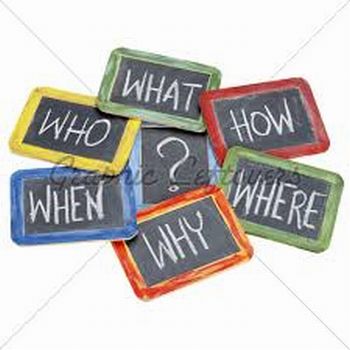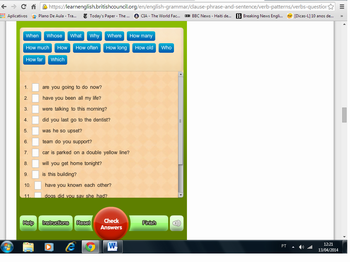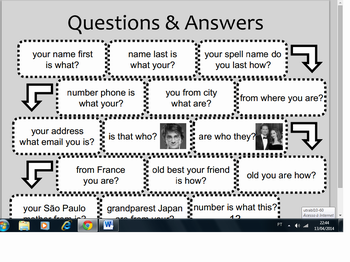22/04/2014
Eliana Dias e Lazuíta Goretti de Oliveira
| Modalidade / Nível de Ensino | Componente Curricular | Tema |
|---|---|---|
| Ensino Fundamental Final | Língua Estrangeira | Textos orais com marcas entonacionais e pronúncia |
| Ensino Médio | Língua Estrangeira | Produção escrita |
| Ensino Médio | Língua Estrangeira | Produção oral |
| Ensino Médio | Língua Estrangeira | Competência comunicativa: componentes linguísticos, sociolinguísticos e pragmáticos |
| Ensino Fundamental Final | Língua Estrangeira | Aspectos morfológicos, sintáticos e fonológicos |
O que o aluno poderá aprender com esta aula
- fazer perguntas em inglês, sobre os mais diferentes temas, utilizando-se de diversos tempos verbais
Duração das atividades
Conhecimentos prévios trabalhados pelo professor com o aluno
Estruturas básicas do inglês: pronomes, verbos e complementos.
Estratégias e recursos da aula
- recursos multimídia;
- vídeos;
- atividades realizadas individualmente ou em grupos/pares;
- texto projetado e xerocopiado;
- imagens veiculadas pela internet;
- jogo;
- painel ilustrativo.
MAKING QUESTIONS

MÓDULO 1
Atividade 1
Warm up
Professor, peça a seus alunos que separem as perguntas abaixo das suas respostas correspondentes. (Essas perguntas deverão estar digitadas e coladas em uma cartolina) Distribua, primeiramente, quantas perguntas forem necessárias entre os alunos, de modo que todas sejam utilizadas. Faça o mesmo com as respostas. Dessa forma, cada aluno deverá receber um conjunto de perguntas e respostas sem correspondência entre elas.
- Disponibilize tempo para que possam ler as perguntas e respostas recebidas. Em seguida, solicite que circulem pela sala fazendo suas perguntas e procurando pela resposta adequada. Essa atividade promove uma dinâmica maior de movimento entre os alunos,que deverão sair de seus lugares, provocando um clima de descontração e interação no grupo.
No final da atividade, todas as perguntas deverão estar com suas devidas respostas. Depois de verificar se todas as perguntas foram corretamente associadas as suas respostas, projete-as, possibilitando uma melhor visualização. Em duplas, os alunos se responsabilizarão pela leitura de cada conjunto de perguntas e respostas. Observe a pronúncia correta das palavras, assim como a entonação das perguntas. Corrija-as se necessário e ajude-os com o vocabulário desconhecido.
1) Personal Information
What's your name?
Peter.
Where are you from? / Where do you come from?
I'm from ... I come from ...
What's your surname / family name?
Smith.
What's your first name?
Tom.
What's your address?
7865 NW Sweet Street
Where do you live?
I live in San Diego.
What's your (tele)phone number?
209-786-9845
How old are you?
Twenty-five. I'm twenty-five years old.
When / Where were you born?
I was born in 1961 / Seattle.
Are you married? / What's your marital status?
I'm single.
What do you do? / What's your job?
I'm a librarian.
Where did you go?
I went to a friend's house.
What did you do?
We played video games.
Where were you?
I was in New York for the weekend.
Have you got a car / job / house / etc.?
Yes, I've got a good job.
Have you got any children / friends / books / etc.?
Yes, I've got three children - two boys and a daughter.
Can you play tennis / golf / football / etc.?
Yes, I can play golf.
Can you speak English / French / Japanese / etc.?
No, I can't speak Japanese.
Could you speak English / French / Japanese / etc.?
when you were five / two / fifteen / etc. years old?
Yes, I could speak English when I was five years old.
2) Introducing Yourself / Saying Hello
How do you do?
How do you do. Pleased to meet you.
How are you?
Fine, thanks. And you?
Shopping
How can I help you? / May I help you?
Yes. I'm looking for a sweater.
Can I try it on?
Sure, the changing rooms are over there.
How much does it cost? / How much is it?
It's $45.
How would you like to pay?
By credit card.
Can I pay by credit card / check / debit card?
Certainly. We accept all major cards.
Have you got something bigger / smaller / lighter / etc.?
Certainly, we've got a smaller sizes as well.
3) Asking Something Specific
What's that?
It's a cat!
What time is it?
It's three o'clock.
Can / May I open the window?
Certainly. It's hot in here!
Is there a bank / supermarket / pharmacy / etc. near here?
Yes. There is a bank on the next corner next to the post office.
Where is the nearest bank / supermarket / pharmacy / etc.?
The nearest pharmacy is on 15th street.
Who wrote / invented / painted / etc. the ...?
Hemingway wrote "The Sun Also Rises".
Is there any water / sugar / rice / etc.?
Yes, there's a lot of sugar left.
Are there any apples / sandwiches / books / etc.?
No, there aren't any apples left.
Is this your / his / her / etc. book / ball / house / etc.?
No, I think it's his ball.
Whose is this / that?
It's Jack's.
4) Questions with 'Like'
What do you like?
I like playing tennis, reading and listening to music.
What does he look like?
He's tall and slim.
What would you like?
I'd like a steak and chips.
What is it like?
It's an interesting country.
What's the weather like?
It's raining at the moment.
Would you like some coffee / tea / food?
Yes, thank you. I'd like some coffee.
Would you like something to drink / eat?
Thank you. Could I have a cup of tea?
5) Asking for an Opinion
What's it about?
It's about a young boy who encounters adventures.
What do you think about your job / that book / Tim / etc.?
I thought the book was very interesting.
How big / far / difficult / easy is it?
The test was very difficult!
How big / far / difficult / easy are they?
The questions were very easy.
How was it?
It was very interesting.
What are you going to do tomorrow / this evening / next week / etc.?
I'm going to visit some friends next weekend.
6) Suggestions
What shall we do this evening?
Let's go see a film.
Why don't we go out / play tennis / visit friends / etc. this evening?
Yes, that sounds like a good idea.
Fonte adaptada: http://esl.about.com/od/beginnerpronunciation/a/basicquestions.htm (acesso em 13.04.2014)
Atividade 2

network-marketing-training-the-5-ways-to-open-up-an-mlm-recruiting-conversation%252F%3B701%3B720 (acesso em 13.04.2014)
- Professor, utilizando-se das perguntas contidas no item 1) Personal Information da atividade anterior, peça para que os alunos deem respostas com informações verdadeiras sobre eles mesmos. Em seguida, os alunos deverão fazer as perguntas uns aos outros e respondê-las. Observe se todos responderam pelo menos a uma pergunta do item 1.
Atividade 3
- Projete o seguinte texto que contém informações de como formular perguntas em inglês. Distribua uma cópia para que cada aluno possa tê-lo em seus registros pessoais. Solicite a leitura do texto pelos próprios alunos e pause em cada momento de dúvidas ou diante da necessidade de uma explicação mais detalhada sobre o assunto. É provável que não haja dificuldades de entendimento do texto, uma vez que os alunos já tiveram oportunidade de formular e praticar diversas perguntas nas atividades anteriores de números 1 e 2.
FORMULATING QUESTIONS
1. Yes/No questions
Yes/No questions are questions to which the answer is Yes or No
Look at these statements:
They are working hard.
They will be working hard.
They had worked hard.
They have been working hard.
They might have been working hard.
We make Yes/No questions by putting the subject, they, after the first part of the verb:
Are they working hard?
Will they be working hard?
Had they worked hard?
Have they been working hard?
Might they have been working hard?
2. Questions and negatives with present simple and past simple forms:
For all verbs except be and have we use do/does and did with the base form of the verb to make Yes/No questions for the present simple and past simple forms:
They work hard >>> Do they work hard?
He works hard >>> Does he work hard?
They worked hard >>> Did they work hard?
The verb have:
We make questions and negatives with have in two ways:
- normally we use do/does or did for questions :
Do you have plenty of time?
Does she have enough money?
Did they have any useful advice?
… but we can make questions by putting have, has or had in front of the subject:
Have you plenty of time?
Had they any useful advice?
3. Wh-questions
Wh-questions are questions which start with a question-asking word, either a Wh- word (what, when, where, which,who, whose, why) or questions with the word how.
Questions with: when, where, why:
We form wh-questions with these words by putting the question word in front of a Yes/No question:
Where are they working?
Why have they been working hard?
Where does he work?
Where will you go?
When did they arrive?
etc.
Questions with who, which and what :
- Sometimes who or what takes the place of the subject of the clause:
Who gave you the chocolates? >>> Barbara gave me the chocolates.
Who is looking after the children? >>> My mother is looking after the children
Who mended the window? >>> My brother mended the window
Who could have done this? >>> Anybody could have done this.
- We use what in the same way:
What will happen?
What caused the accident?
What frightened the children?
When we ask who, which and what about the object of the verb , we make questions in the way described in 1 and 3 above with who, which or what at the beginning of the clause:
He is seeing Joe tomorrow >>> Who is he seeing tomorrow?
I want a computer for my birthday >>> What do you want for your birthday?
She has brought some fruit for the picnic >>> What has she brought for the picnic?
They need a new car >>> What do they need?
We sometimes use which or what with a noun:
What subjects did you study at school?
What newspaper do you read?
Which newspaper do you read – the Times or the Guardian?
Which book do you want?
Questions with how:
We use how for many different questions:
How are you?
How do you make questions in English?
How long have you lived here?
How often do you go to the cinema?
How much is this dress?
How old are you?
How many people came to the meeting?
4. Questions with verbs and prepositions:
When we have a question with a verb and a preposition the preposition usually comes at the end of the clause:
I gave the money to my brother >>> Who did you give the money to?
She comes from Madrid >>> Where does she come from?
They were waiting for more than an hour >>> How long were they waiting for?
5. Other ways of asking questions:
We use a phrases like these in front of a statement to ask questions:
Do you know…? I wonder... Can you tell me …?
- We use these phrase with if for Yes/No questions:
This is the right house >>> Do you know if this is the right house?
Mr. Brown lives here >>> Do you know if Mr. Brown lives here?
Everyone will have read the book >>> I wonder if everyone will have read the book.
… or with wh-words:
I wonder how much this dress is.
Can you tell me where she comes from?
Do you know who lives here?
- We often use do you think…? after wh-words:
How much do you think this dress is?
Where do you think she comes from?
Who do you think lives here?
Fonte adaptada: https://learnenglish.britishcouncil.org/en/english-grammar/clause-phrase-and-sentence/verb-patterns/verbs-questions-and-negatives (acesso em 13.04.2014)
- Professor, é necessário que os alunos tenham acesso às regras de formação de perguntas em inglês. Porém, é de suma importância que eles possam praticar, elaborando suas próprias perguntas. Portanto, não se aprofunde muito no texto, uma vez que este serve mais como referência teórica, para que os alunos possam esclarecer possíveis dúvidas.
MÓDULO 2
Atividade 4
- No laboratório de informática, peça para que cada aluno acesse o site: https://learnenglish.britishcouncil.org/en/english-grammar/clause-phrase-and-sentence/verb-patterns/verbs-questions-and-negatives (acesso em 13.04.2014) e faça as atividades online propostas. Tais atividades referem-se exclusivamente ao conteúdo apresentado na atividade anterior de número 3 e, portanto, é o momento de observar as dúvidas ou dificuldades apresentadas pelos alunos.
Professor, não se esqueça sempre de observar o bom funcionamento das máquinas, para que não haja prejuízo na produtividade dos alunos.

Imagem ilustrativa do site indicado para a realização da atividade
Atividade 5
Distribua o tabuleiro, disponível no site: file:///C:/Users/Casa/Pictures/questions-board-game%20(1).pdf (acesso em 13.04.2014) e peça para que os alunos, em duplas, joguem o jogo que consiste em fazer perguntas e dar respostas. O tabuleiro poderá ser ampliado para uma melhor visualização entre os jogadores. O vencedor de cada dupla deverá ser bonificado com uma prenda a ser escolhida pelo professor (doce, chocolate, pirulito, etc). Ao final, as perguntas poderão ser escritas no quadro, com a ajuda dos alunos. Cada aluno ficará responsável por responder a uma pergunta feita pelo outro colega. Observe a participação de todos os alunos com a atividade.

Imagem ilustrativa do jogo contido no referido site
Atividade 6
Como última atividade da aula, entregue aos alunos a seguinte atividade xerocopiada. Eles deverão ficar atentos ao que está sublinhado, que é justamente ao que a pergunta a ser elaborada deve ser referir. Possibilite o trabalho em duplas, proporcionando um ambiente de maior cooperação. A atividade poderá ser finalizada em casa, caso o tempo da aula tenha se esgotado, como também poderá ajudar na avaliação do conteúdo aprendido na aula.
Write the missing questions according the underlined words or given question words.
1. --------------------------------------------------------------------------------------?
She's wearing a black suit.
2. --------------------------------------------------------------------------------------?
My sister's from England originally.
3. --------------------------------------------------------------------------------------?
Marcos is sitting on the sofa.
4. --------------------------------------------------------------------------------------?
My mother's playing tennis now.
5. --------------------------------------------------------------------------------------?
She works in a hospital.
6. --------------------------------------------------------------------------------------?
He goes to bed at 10:30 p.m. every day.
7. --------------------------------------------------------------------------------------?
Sarah's going to work by bus.
8. --------------------------------------------------------------------------------------?
My mother's first language is English.
9. --------------------------------------------------------------------------------------?
She's wearing white sneakers.
10. --------------------------------------------------------------------------------------?
My favorite color is blue.
11. --------------------------------------------------------------------------------------?
He's eating breakfast in a restaurant.
12. --------------------------------------------------------------------------------------?
My brother lives in Paris.
13. --------------------------------------------------------------------------------------?
My sister loves her job very much.
14. --------------------------------------------------------------------------------------?
She has breakfast at home every day.
15. --------------------------------------------------------------------------------------?
Elizabeth speaks 3 languages: French, English, German.
16. --------------------------------------------------------------------------------------?
Mark works in Switzerland.
17. -------------------------------------------------------------------------------------?
Micheal is a lawyer.
18. -------------------------------------------------------------------------------------?
My brother's from Korea.
19. -------------------------------------------------------------------------------------?
Emily goes to school by taxi.
20. -------------------------------------------------------------------------------------?
I live in a house.
21. -------------------------------------------------------------------------------------?
The book is next to the briefcase.
22. -------------------------------------------------------------------------------------?
I get up around 6:30 in the morning.
23. -----------------------------------------------------------------------------------?
She studies English on Sundays.
23. ------------------------------------------------------------------------------------?
She studies English on Sundays.
24. ------------------------------------------------------------------------------------?
He plays football in his free time.
25. ------------------------------------------------------------------------------------?
She's a judge.
26. ------------------------------------------------------------------------------------?
My brother works in a bookstore.
27. How ----------------------------------------------------------------------------?
Her sister drives to work.
28. How ----------------------------------------------------------------------------?
They use public transportation.
29. ----------------------------------------------------------------------------------?
My father gets to work by subway.
30. ----------------------------------------------------------------------------------?
I stay home on weekends.
Fonte: http://busyteacher.org/11797-making-questions-present-simple-and-present.html (acesso em 13.04.2014)
Recursos Complementares
Para diversas atividades online, acesse:
http://www.espressoenglish.net/an-easy-way-to-form-almost-any-question-in-english/ (acesso em 13.04.2014);
http://www.englishgrammarsecrets.com/questions1/menu.php (acesso em 13.04.2014)
Para textos com explicações sobre o tema, acesse:
http://www.englishgrammarsecrets.com/questions1/menu.php (acesso em 13.04.2014);
http://esl.about.com/library/quiz/bl_beginnerquestions.htm?lastQuestion=38&answers=0&submit=Next+Question+%3E%3E&ccount=35 (acesso em 13.04.2014);
http://www.espressoenglish.net/an-easy-way-to-form-almost-any-question-in-english/ (acesso em 13.04.2014);
http://www.myenglishpages.com/site_php_files/grammar-lesson-tag-questions.php#.U0rSgFXIaQB (acesso em 13.04.2014);
http://www.english-4u.de/askingquestions.htm (acesso em 13.04.2014)
Para vídeos sobre o tema, acesse:
http://www.engvid.com/the-easy-way-to-ask-questions/ (acesso em 13.04.2014);
http://www.youtube.com/watch?v=v2nC0XtJhak; (acesso em 13.04.2014);
http://www.youtube.com/watch?v=dmXqE7ursEM (acesso em 13.04.2014)
Avaliação
- A avaliação deverá ocorrer durante todo o tempo da aula. O professor deverá observar a motivação, o envolvimento e a participação dos alunos nas atividades propostas.
A última atividade da aula poderá ser avaliada, responsabilizando cada aluno pela leitura de uma pergunta e sua respectiva resposta.
Poderá, ainda, ser montado um painel com diversas perguntas trabalhadas em sala de aula. O painel deverá conter imagens ou figuras ilustrativas, Os estudantes deverão abusar da criatividade. O painel deverá ser afixado na classe ou no corredor da escola, possibilitando a visualização pelos demais alunos e professores.
Sem estrelas 0 classificações
- Cinco estrelas 0/0 - 0%
- Quatro estrelas 0/0 - 0%
- Três estrelas 0/0 - 0%
- Duas estrelas 0/0 - 0%
- Uma estrela 0/0 - 0%
Denuncie opiniões ou materiais indevidos!
- Sugestão de aula
- Aulas
- Coleções de aulas
- Criar aula
- Criar individual
- Criar em equipe
- Gerenciar equipes
- Minhas aulas
- Orientações
- Criando equipes
- Dicas para a produção de aulas
- Reflexões pedagógicas
- Utilizando a ferramenta
- Artigo: portal educacional
- Estatísticas de uso do Portal
- Estatísticas de aulas
- Estatísticas de recursos
- Estatísticas de visitas
- Recursos utilizados em aulas
- Reflexões pedagógicas
- Informações de cursos
- Cursos
- e-Proinfo
- Materiais de cursos
- Materiais de estudo
- Artigos e publicações
- Assuntos relevantes
- Avaliações
- Ciência do cotidiano
- Destaques internacionais
- Dicas práticas
- Educação profissional e tecnológica
- Entrevistas
- Estratégias pedagógicas
- Inovações tecnológicas
- Materiais de cursos
- Materiais de evento
- Orientações e diretrizes
- Parâmetros e referencias
- Programas em vídeos
- Tutoriais
- TVescola
- Ferramentas do portal
- Fórum
- Portal do Youtube
- Compartilhando apresentação
- Ferramentas pela internet
- Blog
- Compartilhe vídeos
- Comunicação on-line
- Crie e compartilhe apresentações
- Edite e compartilhe fotos
- Escrita colaborativa
- Junte-se a uma comunicade
- Lista de discussão
- Organize e compartilhe favoritos
- Podcast
- Rádio/TVs Universitárias e outros
- Redes Sociais
- Robô Ed
PLATAFORMA FREIRE
- Bibliotecas
- Capacitação Proinfo Integrado
- Cultura
- Dicionários, tradutores e enciclopédias
- Educação inclusiva
- Geoprocessamentos
- Inclusão digital
- Infográficos
- Jogos educativos
- Jornais
- Museus
- Observatórios e planetários
- Organizações governamentais
- Plataformas educacionais
- Portais educacionais e outros
- Portal MEC
- Prêmio professores do Brasil
- Produções de professores
- Projetos de escolas
- Projetos inovadores
- Projetos sociais e educacionais
- Rádio escola
- Recursos digitais
- Revistas
- Sites de busca
- Sites temáticos do portal e TVescola
- Softwares de edição e outros
- Softwares educacionais
- Um computador por aluno

- Ryan Oksenhorn
- Ryan Snow
- Sergio Caldara
- Shane Miler
- Shane Herzog
- Sotirios Papavasilopoulos
- Stephen JB Thomas
- Tarah
- Valera Nazarov
- ZbigniewMa K Flakus


